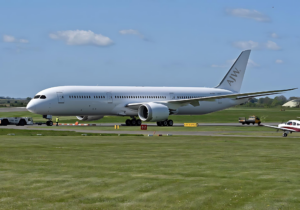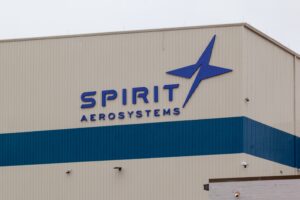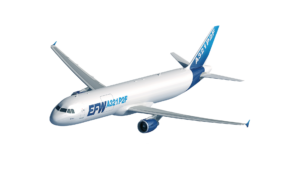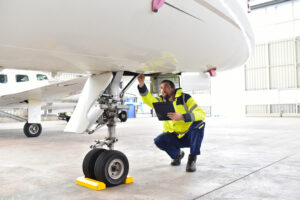By: Allan Bachan, VP, ICF Aviation
The MRO industry currently faces a multitude of challenges from rising costs to supply chain inefficiencies and a shortage of technical manpower. At the core of issues facing the industry is a culture of hesitation toward technological advancement — even though technology holds a key to tackling those very challenges. As a result, MRO has fallen behind every other sector of aviation in the adoption of digital solutions. The good news: it’s not too late to catch up.
Hesitation is a natural response to the myriad obstacles associated with advancing maintenance and repair into the digital age. After all, technological implementation is no easy feat. Despite the promising possibilities that digital solutions offer MRO, adoption would require operators to face the daunting task of identifying and incorporating the right technology across massive, multifaceted organisations. Progress would require them to overcome hurdles such as changing processes, training hundreds of workers on new systems, establishing compatibility with other technology applications, and ensuring that software vendors can deliver broad, complex technical support.
Navigating these concerns requires a strategic formula for success that also includes borrowing tactics from other sectors, both inside and outside of the aviation space. On the execution side, the introduction of technologies including drones, artificial intelligence (AI) and virtual reality (VR) has streamlined operations and improved efficiency across numerous industries. On the control and compliance side, aviation assets like aircraft and engines have long moved away from solely ‘hard-time’ and “soft-time.’ ‘On-condition’, condition-monitored’ and ‘health monitored’ are the new standards. It’s time for adjustments and increased adoption by the MRO community.
Applying new technology to aviation MRO
Aviation MRO needs more aggressive technological transformation. This encompasses core functions that involve touching the asset, such as inspections and repairs. For instance, aircraft mechanics can spend less time troubleshooting by enhancing productivity with prescriptive fixes and the assistance of VR. This may involve experienced specialists talking mechanics through repairs remotely. Meanwhile, more aircraft inspections could be accelerated and automated using robots and drones, which may
capture images and map out damages to the structure of an aircraft without needing a person physically present. Note how this evolution also changes the emerging nature and range of the skills and personnel to support aircraft maintenance.
Just as important, technology also improves operations and processes for those who do not directly work on the aircraft. Supporting functions like maintenance planning, supply chain and record keeping can immensely benefit from digitalisation as well. Machine learning, AI and business analytics solutions could significantly speed up management and control activities. For example, predictive maintenance would render it possible through simulation – to proactively anticipate what preventative work should be done to facilitate 100 percent mission reliability for an aircraft to travel certain routes over a future period. This will allow MRO professionals to accurately plan for and execute maintenance activity before any problems arise.
Borrowing inspiration from outside of MRO
The rate of innovation is exceeding the rate of adoption in aviation technical operations. Original equipment manufacturers (OEM), like Boeing and Airbus, are already tapping new solutions – including integrating internet of things (IoT) technology into aircraft and engines – to make major upgrades. Industry leader buy-in to the technology renders it essential that the MRO space adapts in response.
For instance, every new aircraft is being outfitted with more sensors that read the performance of its components, functioning in a similar fashion to wearable smart devices that may encourage exercise. If something goes wrong in-flight, the plane may communicate the issue to support resources on the ground. As operations of more aircraft become expectant for this kind of technology, the traditional ways of resolving problems will less apply. Instead, a repair team may need to run data intensive diagnostics before it can determine what is needed for the fix — if they are constrained in doing so, the problem may go unaddressed for a prolonged period. Overall, it is anticipated that less time will be spent physically executing the fix. Rather, more time will be in analysing parameters and data to define the fix. We will be well served to automate such analysis.
Given the lagging digital adoption rates in MRO and the advancements in manufacturing processes, OEMs should consider leveraging their influence, holding hands with the operators if necessary, in order to facilitate greater technological momentum in the aftermarket. In addition to adopting innovations from aviation OEMs, MRO leaders can also gain valuable insight from observing technological advancements in industries entirely outside the aviation realm. For example, some particularly wellproven methods are engaged in the energy and automotive sectors with respect to maintenance execution where robotics and touch free applications have been widely adopted. VR, robotics and paperless records are also well-established in the health sector — which, like aviation, is a highly regulated space.
Taking actionable steps forward
In order to make concrete strides toward a technology-driven future, organisations need to first and foremost understand that uncertainty is inevitable. Some level of this must always be tolerated, as all risks can never be fully eliminated from any evolving tech project. That said, there are ways to minimise it as MRO embraces digitalisation. More specifically, running well controlled beta programmes is an effective tactic for moving the meter forward toward scaling systems fully while keeping failure within controlled limits.
After moving past any risk-related hesitation, it’s crucial to establish a good change management strategy that strikes the ideal balance between advancement and realistic project scope. Organisations must bear in mind there will always be exciting, new tech on the horizon. However, the primary goal should be to keep an eye on achievable progress without getting distracted by the “next big thing.”
The most impactful way to continuously push this forward progress is by employing a “brick-by-brick” approach. This means always having at least one active project driving technological change, which in turn keeps the organisation focused on the long-term. This method removes intimidation from the process of digital transformation. While looking at the full spectrum of possibilities makes the idea of introducing innovation overwhelming, selecting a specific solution to implement step by step all at once makes the undertaking feel manageable.
Looking ahead
Aircraft MRO is primed for a technological revolution. Traditional systems still in wide use are limiting productivity and efficiency gains. While they effectively served the needs of the past, they simply won’t serve the needs of the future. In today’s increasingly digital world, keeping up with the pace of innovation is no longer an option for MRO leaders; it’s a necessity. Ultimately, adopting digital solutions will not only save money in the long term; it will lay the solid foundation necessary to propel aviation into the future. Change is overdue, and it’s time for MRO leaders to commit to a firm digital path forward.





























